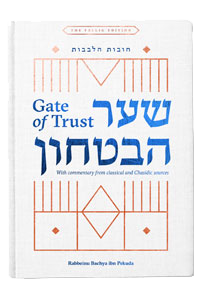Shaar Habitachon - Gate of Trust Introduction - Part 6: Financial Satisfaction
Shaar Habitachon - Gate of Trust Introduction - Part 6: Financial Satisfaction

Source: Introduction - Part 6: Financial Satisfaction - Shaar Habitachon - Gate of Trust (chabad.org)
וּמִתּוֹעֶלֶת הַבִּטָּחוֹן בַּה' בְּעִנְיַן הַתּוֹרָה כִּי הַבּוֹטֵחַ בַּה'
Among the advantages of bitachon with regard to Torah observance is that a person who places his trust in G-d will utilize his finances correctly.
אִם הוּא בַּעַל מָמוֹן יְמַהֵר לְהוֹצִיא חוֹבוֹת הָאֱלֹהִים וְחוֹבוֹת בְּנֵי אָדָם מִמָּמוֹנוֹ בְּנֶפֶשׁ חֲפֵצָה וְרוּחַ נְדִיבָה.
For if he has money, he will hurry to fulfill his obligations to G-d, such as buying kosher tefillin, tzitzit, extra food for the Shabbat meals, and the like, as well as fulfilling his obligations to other people, such as fulfilling the commandment of charity, giving out loans to those in need, and so on. He will do so willingly and generously.
וְאִם אֵינֶנּוּ בַּעַל מָמוֹן יִרְאֶה כִּי חֶסְרוֹן הַמָּמוֹן טוֹבָה מִטּוֹבוֹת הַמָּקוֹם עָלָיו,
If he does not have money, then he will pay attention to the fact that the lack of money is actually a kindness from G-d upon him.
מִפְּנֵי שֶׁנִּסְתַּלְּקוּ מֵעָלָיו הַחוֹבוֹת שֶׁהוּא חַיָּב בָּהֶם לֵאלֹהִים וְלִבְנֵי אָדָם בַּעֲבוּרוֹ,
This is because as a result of lacking money, he has been relieved of the obligations to G-d and to other people, which would have been incumbent upon him due to his money.
וּמִעוּט טִרְדַּת לִבּוֹ בִּשְׁמִירָתוֹ וְהַנְהָגָתוֹ,
He also has fewer worries about guarding his money and taking care of it.
כְּמוֹ שֶׁנֶּאֱמַר עַל אֶחָד מִן הַחֲסִידִים שֶׁהָיָה אוֹמֵר: הַמָּקוֹם יַצִּילֵנִי מִפִּזּוּר הַנֶּפֶשׁ. אָמְרוּ לוֹ: מַה הוּא פִּזּוּר הַנֶּפֶשׁ? אָמַר: שֶׁיִּהְיֶה לִי מָמוֹן בְּרֹאשׁ כָּל נָהָר וּבְרֹאשׁ כָּל קִרְיָה.
As has been said regarding one of the pious men that he would say: “May G-d save me from the ‘scattering of the mind.’” They asked him: “What is ‘scattering of the mind’?” He replied: “Were I to have money at the port of each river and the heights of each city.”
וְהוּא מַה שֶּׁאָמְרוּ זִכְרוֹנָם לִבְרָכָה (אבות ב, ז) "מַרְבֶּה נְכָסִים מַרְבֶּה דְאָגָה," וְאָמְרוּ (אבות ד, א) "אֵיזֶהוּ עָשִׁיר הַשָּׂמֵחַ בְּחֶלְקוֹ."
This is what the Sages of blessed memory meant when they said ( Avot 2:7): “The more possessions, the more worry,” and when they also said ( Avot 4:1): “Who is truly wealthy? A person who is content with his lot.”
וְהַבּוֹטֵחַ בַּה' יַשִּׂיג תּוֹעֶלֶת הַמָּמוֹן, רְצוֹנִי לוֹמַר פַּרְנָסָתוֹ, וְתִמָּנַע מִמֶּנּוּ טִרְדַּת הַמַּחֲשָׁבָה שֶׁל בַּעַל הַמָּמוֹן וְהַתְמָדַת דַּאֲגָתוֹ לוֹ, כְּמוֹ שֶׁאָמַר הֶחָכָם (קהלת ה, יא) "מְתוּקָה שְׁנַת הָעֹבֵד אִם מְעַט וְאִם הַרְבֵּה יֹאכֵל, וְהַשָּׂבָע לֶעָשִׁיר אֵינֶנּוּ מַנִּיחַ לוֹ לִישׁוֹן."
A person who trusts in G-d will receive all the benefits of the money—I mean to say, the benefits of his livelihood—while the disturbing thoughts of a wealthy person and his constant worry will be withheld from him. As the wise man, King Solomon, said (Ecclesiastes 5:11): The sleep of the laborer is sweet, whether he eats little or much, but the satiety of the rich does not allow him to sleep.












Comments
Post a Comment